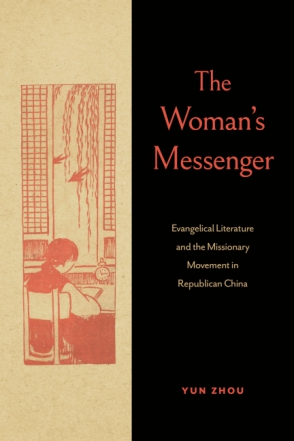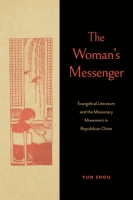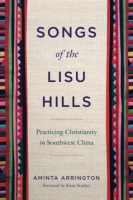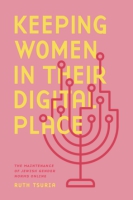
The Woman’s Messenger
Evangelical Literature and the Missionary Movement in Republican China
Yun Zhou
The Woman’s Messenger
Evangelical Literature and the Missionary Movement in Republican China
Yun Zhou
“This book deftly uses the Christian women’s journal Nü duo to discuss Chinese Christian women’s construction of female subjectivity, gender roles, and social responsibility amid rapid political changes in the first half of the twentieth century. It makes critical contributions to the study of how Chinese Christian women participated in the global discourse of female domesticity, the ideal family, and modernity.”
- Description
- Reviews
- Bio
- Table of Contents
- Sample Chapters
- Subjects
At the turn of the twentieth century, American missionary women established Nü duo (The Woman’s Messenger), a Christian women’s magazine based in Shanghai whose publication spanned four decades of changing values around feminine virtue. Tracing the magazine’s evolution across its three editors, Zhou shows how growing intellectualism among the magazine’s staff and readership challenged a homogenous ideal of womanhood. While Nü duo began under the editorship of a white American missionary championing traditional domestic values, the Chinese editors who went on to lead the magazine in subsequent decades broadened the boundaries of Christian gender ethics, emphasizing matters of indigenous agency, leftist thinking, theodicy, and personal spiritual elevation. Zhou shows how the magazine’s trajectory points to a subtle yet profound process wherein the women involved—navigating ideas concerning God, gender, nation, warfare, and even the details of everyday life—became agents of historical change rather than mere recipients of it.
Drawing from a wide range of sources from China and the West, this book makes an important contribution to the fields of women’s studies, print culture, modern Chinese history, and world Christianity.
“This book deftly uses the Christian women’s journal Nü duo to discuss Chinese Christian women’s construction of female subjectivity, gender roles, and social responsibility amid rapid political changes in the first half of the twentieth century. It makes critical contributions to the study of how Chinese Christian women participated in the global discourse of female domesticity, the ideal family, and modernity.”
“The Woman’s Messenger is the first study of a major Christian magazine circulating in China during the early and mid-twentieth century. It explores the experiences of the women behind the publication and their efforts to promote Christian ‘family values' in a rapidly changing China. Scholars interested in how religion and gender have shaped modern China will find much of interest in this book.”
Yun Zhou is Lecturer at the College of Asia and the Pacific at The Australian National University.
List of Illustrations
Acknowledgments
List of Abbreviations
Introduction
chapter 1 Transforming Eve to Modern Mary: Nü duo and the Making of a New Nation
chapter 2 Navigating Western Notions: Nü duo amid Rising Nationalism in the 1920s
chapter 3 From Reform to Rupture: Li Guanfang and Chinese Women’s Growing Agency
chapter 4 Liu Meili and Wartime Nü duo: The Surge of Female Subjectivity
Conclusion
Appendix
Notes
Bibliography
Index
Download a PDF sample chapter here: Introduction
Also of Interest
Mailing List
Subscribe to our mailing list and be notified about new titles, journals and catalogs.






